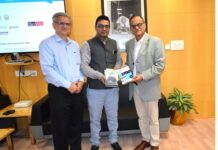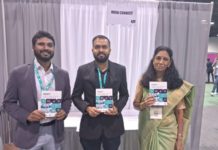About Author: Prasanna Kumar B Shirol is the Co Founder of Organisation for Rare Diseases India also popularly known as ORDI. He is also the President of Pompe Foundation besides being the Founder and Former President of Lysosomal Storage Disorder Support Society. He has worked extensively to create awareness on LSD and Rare disease in India. He has represented India in various conferences and meetings internationally developed a strong network of international Parent and Rare disease groups.
A rare disease is any disease that affects a small percentage of the population. There is no universal definition of Rare Disease. For example, in the USA, it is defined strictly according to its prevalence, specifically any disease or condition that affects less than 200,000 persons; in Japan is 50,000 persons; in Korea 20,000; in Taiwan10,000; and in Australia 2000, etc. The World Health Organization (WHO) has suggested that a rare disease should be defined as one with a frequency of less than 6·5–10 per 10,000.
The exact number of rare diseases is not known, but is estimated to be around 7000–8000 world wide increasing steadily each year with new diseases and associated genes being discovered. About 80 percent of rare diseases are genetic in origin and 50 percent of them affect children. All rare diseases taken together affect about 6–8 percent of the world’s population.
Key Challenges
- Awareness – Lack of awareness among general public is very low, unfortunately even among medical fraternity.
- Early Diagnosis – Key challenge associated with rare diseases globally is the inability of the medical system to properly diagnose these diseases in a timely manner, Early diagnosis is essential for proper disease managemen The average time to diagnose rare disease is 7 years even in developed countries like USA. It is longer in developing countries.
- Treatment and cost – There are only around 500+ FDA drugs available. The cost is often prohibitive due to high development costs and fewer patients.
- Education and genetic counseling (GC) are critical necessities to help patients and physicians deal with rare GC is needed at various levels such as prior to genetic testing, post-testing, prenatal diagnosis and family planning particularly in consanguineous marriages.
- Support Groups : There are few Indian organizations devoted to rare diseases and support the rare disease patients for LSD, Muscular Dystrophy, IEMs, Rett Syndrome, etc.
- Health Care Policy – There is no comprehensive healthcare policy for Rare Disease in India for any category/class.
- Research and Development – There is no specific focus towards Research and Development in this area. There is a need to encourage and fund academic research, Pharmacutical and biotechnology industry to take such R&D work and development of drugs for rare diseases.
Future perspectives
Although the challenges for rare diseases appear to be of Himalayan proportions, the advent of precision medicine, otherwise referred to as personalized medicine, offers hope in the diagnosis and treatment of rare diseases. Precision medicine is being applied in relatively common disorders such as cancer, immunediseases and infectious diseases.
India has a high potential to cost-effectively develop and manufacture small molecule drugs, biologics and vaccines for rare diseases due to its inherent capabilities in drug and vaccine development.
The rapid growth and innovations in molecular diagnostics and bioinformatics globally are also likely to have a beneficial impact on precision diagnostics for rare diseases. The advent of NGS in the clinic has led to the application of multi-gene, exome and whole genome-based diagnostic tests. India’s strength in information technology and bioinformatics will be highly beneficial in the development and democratization of precision diagnostics for rare diseases.
Developments in India
In recent years, some significant developments have taken place that will change the future of health care in India. First, the launch of the Rasthtriya Bal Swasthya Karyakram (National Health Program for Children), on 6th February 2013. It covers 270 million children starting from birth to 18 years of age, in a phased manner and moving towards the goal of Universal Health Coverage. This program screens for 30 health conditions among children including defects at birth, deficiencies and diseases, development of disabilities and also helps manage these conditions.
Recent news about the Universal Healthcare Policy by the central Government is a hope for this neglected community.
In India, an organization that can unite all rare disease stake holders under a single umbrella, and speak in a single voice for them does not exist. The lack of such an umbrella organization has reduced the effectiveness of the disease specific organizations as much of their resources are directed towards common causes such as raising general public awareness about rare diseases. As a result, progress in assisting patients with rare diseases is slow, leaving many patients hapless.The need for an umbrella organization that can provide a common framework for these disease-specific organizations to function effectively and to focus on their mission is clear. Such an organization could provide generic patient registries compliant with regulatory requirements in India, develop and maintain a comprehensive information portal about rare diseases, create and maintain a sample biorepository for useby.
Organization for Rare Diseases India (ORDI) was founded to address the many challenges in management of rare diseases in India. It addresses the unmet needs of rare disease patients in India and serves as an umbrella organization for rare disease patients and other stakeholders throughout the country.
Lack of awareness about rare disease even among doctor’s means that diagnosis can often take many years. The cost of diagnosis and treatment can also be prohibitively expensive. In the absence of a national government policy surrounding rare disease, there is no push for the development of orphan drugs, which can provide relief for patients with rare disease.
ORDI runs a national rare disease hotline (+91 8892 555 000) to provide information and advice to patients with rare diseases needing medical and non-medical assistance. This dedicated helpdesk goal is to enable patients have access to information and resources to guide them through the process of diagnosing and dealing with the rare conditions affecting their health and quality of life.
Early diagnosis and intervention is the key first step in tackling rare disease. As the average diagnosis time is 7 years, to address this challenge ORDI has designed an innovative program called Rare Disease Care Coordination Center (RDCCC) which serves as a nation-wide hub. This hub gathers patient information, patient needs, and then arranges for consultation with rare disease experts at one of their national-wide Centers of Excellence (CoEs) which is a multi-speciality hospital. These CoEs are jointly staffed by ORDI and hospital partner for patient care. As of now we have three hospital partners in South India and two hospitals in North India.
ORDI plans to conducts various workshops educating rare disease patients and their parents. The mission of ORDI is to catalyze the rapid development and delivery of affordable diagnostics and treatments for rare diseases through innovative collaborations and partnerships among stakeholders to benefit rare disease patients in India.

































































